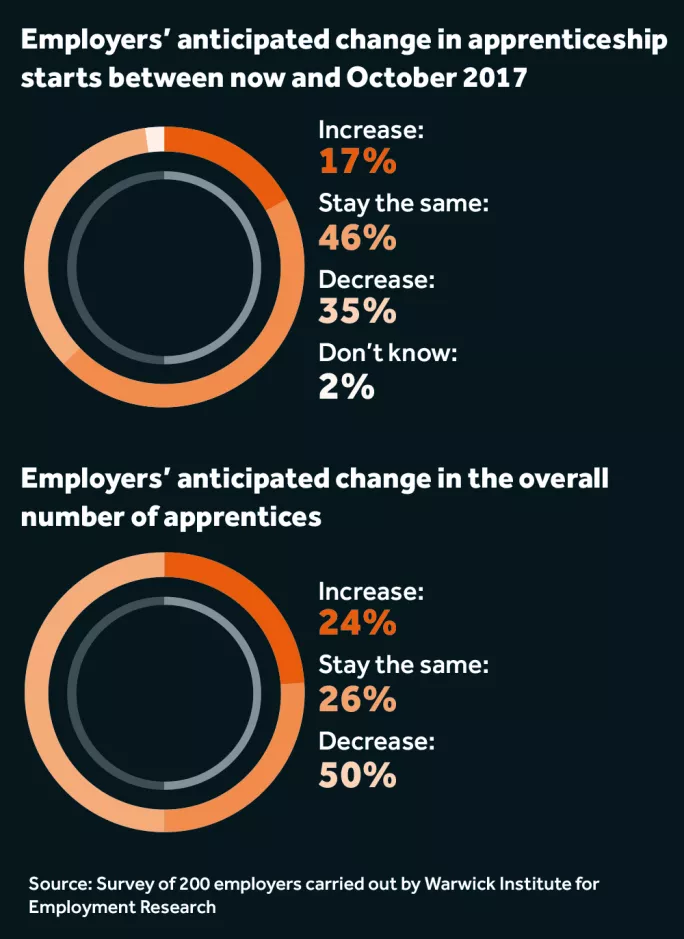Apprenticeship starts are likely to fall despite levy

The apprenticeship levy has been hailed as a game-changer for the FE sector, as well as the government’s main policy lever in its bid to reach the target of creating 3 million apprenticeship starts by 2020.
Its introduction will, according to the Department for Education, see the annual investment in apprenticeships in England reach £2.5 billion by 2019-20.
But it seems that all is not going entirely to plan. A new study by the Warwick Institute for Employment Research suggests that not only could the growth of the apprenticeship programme be slower than expected, but the number of starts is actually likely to drop in the coming months.
The research, commissioned by the Association of Employment and Learning Providers (AELP), found that over a third of employers plan to reduce the number of apprenticeship starts between now and October, with just 17 per cent anticipating an increase in the total during the period.
Half of employers plan to reduce their overall number of apprentices, compared with a quarter anticipating an increase.
If these trends were replicated across the country, it would equate to “a net fall in apprentice numbers of 17 per cent”, according to the institute, with the drop most pronounced among non-levy payers.
According to AELP chief executive Mark Dawe, there are several reasons for this. In the case of large firms that pay the levy, many are holding back on recruiting apprentices due to economic uncertainty ahead of Brexit. Some are still waiting for their legal departments to clear the new contract between the Education and Skills Funding Agency (ESFA) and employer, Mr Dawe adds, with others simply taking advantage of the fact that they have a full two years to spend their funding.

There is also a move among some levy payers towards focusing on a small number of high-level apprenticeships, which are more expensive than those at level 2 or 3. In some sectors, there is also a reluctance among employers to pay the 10 per cent co-investment contribution that they are obliged to pay under the new apprenticeship policy, says Mr Dawe.
The number of apprenticeship starts from non-levy-paying businesses will also drop, the research indicates. Earlier this year, the AELP warned that allocations for providers offering training for non-levy payers were 50 to 80 per cent lower than last year, threatening providers’ financial health and sustainability.
The £440 million procurement exercise to support non-levy-paying employers was “paused” in April, with the ESFA saying procurement had been “markedly oversubscribed”. Instead, existing contracts have been extended until the end of the year, preventing new players from entering the market.
Mr Dawe says the research confirms providers’ concerns: “In terms of the levy payers, the levy is fantastic, but the reality is it could take them months until they can take on any apprentices and years until they use up their levy money. I think of it as a three-year cycle. That means, for the next two years, the levy payers won’t approach numbers anywhere near what the government expects.” Without extra investment in apprenticeships for non-levy-paying employers, “staff will lose their jobs and providers will go bust,” Mr Dawe warns.
Provider ITEC Learning Technologies, which delivers apprenticeships as a subcontractor, is expecting the number it delivers to drop by about 80 per cent compared with last year. “That will make it very difficult for our business to survive,” says chief executive Wendy Vickers. “To me, [the government] has put all the focus into the large employers and the small employers have been left in the cold. Small providers like us feel like we have been kicked to the kerb with them.”
Neil Carberry, the CBI’s director for people and skills, says the business organisation has been “clear from the outset about the risk that the [levy] would not increase the overall level of high-quality training, due to the narrow scope for spend and increased pressure on training budgets”.
He adds: “The design of the levy needs to evolve towards a more flexible skills levy that meets business needs by broadening the variety of high-quality training accessible to young people and adults.
“The government needs to work closely with business to make sure we get this right.”
A spokesman for the DfE says: “We are committed to ensuring that all businesses, including the very smallest, continue to play an important role in giving people their first step on the career ladder. That is why generous support is being provided for smaller employers with the government paying 90 per cent of their costs of training.”
You need a Tes subscription to read this article
Subscribe now to read this article and get other subscriber-only content:
- Unlimited access to all Tes magazine content
- Exclusive subscriber-only stories
- Award-winning email newsletters
Already a subscriber? Log in
You need a subscription to read this article
Subscribe now to read this article and get other subscriber-only content, including:
- Unlimited access to all Tes magazine content
- Exclusive subscriber-only stories
- Award-winning email newsletters